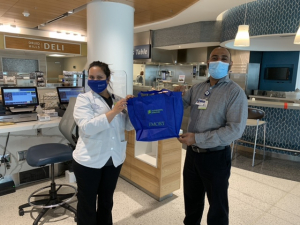
By: Kristin Kuwada, Communications & Marketing Intern, Office of Sustainability Initiatives
As of September 28th, Emory University Hospital (EUH) no longer offers single-use plastic bags in its retail spaces, including Clifton Café, Asbury Café and the gift shop. According to Sabrina Bauggue, the Director of Food and Nutrition Services at EUH, this initiative will save 206,000 plastic bags from entering landfills, which is over 2,000 pounds of plastic waste and is predicted to cut costs by $1,212 annually. Sabrina exemplifies the hope for this initiative among other sustainable measures taken at EUH by saying “every bit of waste we can reduce helps protect our planet for generations to come.”
This initiative started as a proposal written by Clint Owens, Unit Director of the Neuroscience Intensive Care Unit at Emory University Hospital, who sent a letter to Emory Healthcare leadership calling for the reduction in plastic waste throughout Emory Healthcare. Clint saw the need for change within the healthcare industry due to its problematic materials consumption and interconnectedness to the largest polluters of air, water and soil. He cited his concern with the deeply unsettling fact that the healthcare industry contributes to 10% of our nation’s total greenhouse gas emissions (Eckelman & Sherman, 2016). In Clint’s proposal, he stressed that reducing single-use plastic would decrease Emory Healthcare’s overall waste as well as costs associated with waste processing. He also recognized that toxic microplastics from plastic use and production present a safety hazard to the general population because of their ability to contaminate food, watersheds and air.
The reduction of single-use plastic complements Emory Healthcare’s goal for diverting at least 37% of its total waste from area landfills by 2025. Eliminating plastic bags from retail spaces is only the most recent commitment made by EUH to reduce and divert waste without compromising patient safety. Over the last decade, the cafes have transitioned away from Styrofoam to serving food and drinks in paper compostable to-go containers. In 2019, EUH implemented bottle and can recycling in the cafes as a response to another proposal by Healthcare participants in the Woodruff Health Sciences Leadership Academy. The goals of these actions are to reduce Emory’s negative contributions to climate change and health disparities in our community. These actions underscore the value of everyone’s role in climate solutions, from the idea by Clint Owens to implementation by Sabrina Bauggue and Asad Khan, Assistant Director of Food and Nutrition at EUH. Asad reflects on his role by saying he is “proud to work for a place that reinforces the ideals of sustainability and does its part in ensuring a greener planet for our children.”
